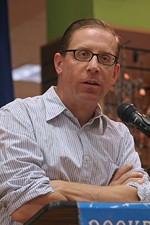Free to Be Me
Elliot Leaves Statesman for Alternative Weekly
Fri., Dec. 22, 1995
He is an award-winning winning journalist whose best stories have attacked government inefficiency and indifference. When talking of the newspaper business, he is adamant about the moral responsibilities he believes must guide this industry. The passion and feeling he brings to his new position leave many in Austin highly optimistic about the continued improvement at the paper at which he is now employed.
No, we're not describing former Charlotte Observer editor-in-chief Richard Oppel, the man many have credited with sparking new life at Austin's only daily. Instead, meet David Elliot, who spent five and a half years as a Capital Bureau reporter for the Statesman. In early September, this 32-year-old Austin native left the world of mainstream journalism, accepting the job of Managing Editor at The Texas Triangle.
Elliot is the first ever to hold this title at the three-year-old publication. He spends about half of his time writing, the other half both coordinating a small staff of freelancers and pursuing a host of other duties that must be finished before an issue can go to press. In a nutshell, his job is implementing policies and story ideas established by founding Editor and Publisher Kay Longcope. He handles the details, while she's got the overall vision.
And what a vision it is. For those unfamiliar with it, The Texas Triangle is the state's premier news-oriented gay newspaper (that it does not accept advertising from sex-related, 900 telephone numbers is a point of considerable pride). Produced in a quaint office on West Sixth Street, the tabloid is distributed free in Austin, Houston, San Antonio, and Dallas, plus various other Lone Star locales. Over 40,000 readers pick up the Triangle for its in-depth coverage on topics like AIDS, discrimination, hate crimes, and the growing power of the religious right. Meanwhile, a lively arts and entertainment section provides these readers some much-needed insight on various cultural happenings.
In fact, the Triangle's strong editorial focus was the impetus for Elliot's decision to leave his safe job at the daily for the uncertainty of an upstart weekly. "I think I'm part of a first wave," explains the new managing editor. "I think in the future we're going to see more mainstream journalists leaving newspapers to work for alternative weeklies because they just can't say what needs to be said at these dailies."
Elliot feels that what needs to be said is the significance of the AIDS epidemic, especially when recent figures show a total of 2,615 reported cases in Austin. "This has been a huge problem for 14 years and it's going to become bigger and bigger. I felt like it would be good to have an AIDS beat. Sure, the Statesman covers AIDS, but they parcel it out to different reporters. The result is that some really horrendous mistakes get made. Nobody develops an extensive knowledge of the disease. For example, in their coverage of the Walk for Life March, the Statesman said that AIDS is now a heterosexual disease. Well, I know what they are trying to say, that heterosexuals are among the groups that are getting it at the highest rate. But that's not accurate. It's not just a gay disease, it's not just a straight disease. It's a disease that affects everyone.
"I just don't think they [at the Statesman] are really sensitized to this issue," continues Elliot, who won the statewide NAACP Media Award in 1994 and the People First Award for Media Coverage in 1993, in addition to two Associated Press Managing Editor's Awards in 1993. "They say `Oh, we're going to cover AIDS, we're going to do stories on AIDS.' But it's all event-driven coverage. They will cover a march or they will cover a controversy at the Texas Education Agency. But I think there is a larger issue and this is the problem I have with Rich Oppel. Sure, the writing and the reporting over at the Statesman has improved, but I still don't think the paper has a soul or any real compassion. I mean what are the most important traits for a journalist? Intelligence? Writing ability? No, it's empathy and compassion and tolerance. In order for this country to wake up to the horror of AIDS, must every family in the nation have someone who is affected, someone who dies?"
Clearly, the frustration he felt on this particular matter was a reflection of Elliot's general disenchantment with the Statesman. In retrospect, he feels he probably should have left the paper a few years earlier, when these feelings of frustration first started to surface. That he did remain through the end of summer, however, gives him an interesting perspective on the changes it is experiencing under the new editor.
"I think Oppel has a lot of talent, and I think that's shown already. But pick out a set of issues and ask yourself, has the newspaper's coverage really improved. Freeport? Yes. Growth issues in Williamson County? Absolutely. Traffic congestion? You bet. But what about social services? Their social services reporter keeps getting pulled off to write stories about football. What about AIDS? What about our criminal justice system? So I guess it depends [on] what you are looking for. In terms of the issues I consider important, it's actually a backwards march from Maggie Balough. When Maggie was editor, we covered East Austin. Then, we had one reporter who covered AIDS on a regular basis and there was more of a commitment to diversity. You don't see that anymore and that's sad."
What has remained the same, according to Elliot, is the logjam that stifles good reporting from getting to the readers: "You still have way too many mid-level editors running around covering their own asses. There's a lot of really mediocre talent. Stories are edited via committee of three or four or five editors. Others are held for days and days and days, until they get on TV before they get into the paper. When I was there, it got so bad that I would not propose in-depth stories to them because I was afraid of how they'd come out in print. The fight wasn't going out and getting the story and writing it up. The fight was getting it into the newspaper."
Elliot contends that this fight is largely irrelevant at papers like the Triangle. He says that he tries to always accommodate the input of his reporters, trusting their judgment on the length at which a story should run. Such input is one of several factors that has won his heart to the alternative press: "When I first started working at the Statesman, I used to say, `Oh, advocacy journalism. Oh, that's a bad thing.' But I think I've come full circle on that now. Advocacy journalism is extremely important. Think of how much poorer our community would be if it were not for publications like the Chronicle and the Triangle."
The community would also be a lot less informed. Elliot speaks of various issues the Triangle has covered over the last few weeks -- an Austin lesbian who has been denied custody of her two children by a homophobic Minnesota judge, a man in San Antonio who killed himself after the local newspaper revealed his sexual orientation.
"No one else is going to tell those stories," he notes. "The Triangle's role is to cover the news that the mainstream won't cover. That's the void we are always going to fill. We are a community newspaper in the truest sense of the word. We need to always promote empathy and compassion and tolerance. As we head into 1996, I can't overemphasize the importance of these values." n
Got something to say on the subject? Send a letter to the editor.








